Oops. You have a pocketknife at the airport. What to do?
Earlier this month, I found myself on the wrong side of the law at LAX. And I got away with it.
But I don’t feel good about it.
Fishing around for snacks in my fanny pack at the gate before boarding my flight to Vancouver, I found a 3-inch Swiss Army knife I’d forgotten about. Airport security had overlooked it too.
Knowing it was illegal to carry the knife onto the plane, I tossed it into a wastebasket and said nothing to anybody.
Wrong, I’ve since decided. Or at least not the best choice.
My lapse made me wonder: What should people do when caught with forbidden objects at the airport?
I discovered they have several options. Among the fastest-growing are services that help you mail your treasures to yourself. Dozens of airports, including several in California, offer these; LAX , citing security and space issues, has no current plans for one.
Certainly there’s a need.
The federal Transportation Security Administration, in the last three years, has detected more than 17 million knives, scissors, firearms and other forbidden items at the nation’s 428 airports. Despite frequent public reminders, monthly figures aren’t declining. The TSA in July intercepted a record 690,692 banned items.
“The message is not getting out there,” said Heather Lowry, president and chief executive of CheckPoint Mailers Inc., a mail-back service based in Huntersville, N.C., that operates in 18 airports.
Or maybe, like me, passengers just forget. Whatever the reason, Lowry said, business at CheckPoint, which serves 5,000 customers a month, grew 37% in the last year.
It is illegal even to take a forbidden object to a checkpoint, much less take it on a plane. (For a list, visit www.tsa.gov.) Doing so can subject you to civil fines of up to $10,000, plus possible criminal prosecution.
As a practical matter, TSA spokesman Nico Melendez said, the agency is concerned mainly with blocking switchblades, firearms, explosive devices and other heavy-duty threats to aviation safety.
If caught with carry-on contraband, the unwary usually have four options besides surrendering it: Put it in a checked bag, give it to a relative or friend who’s seeing you off, take it back to the car, or ship it home.
Each option has pitfalls. You may not have driven to the airport, your bags may have been long since checked, you may be alone, or you may be hard-pressed to find a mail drop-off. After the terrorist attacks of Sept. 11, 2001, many airports, including LAX, closed their postal stations because they were thought to pose security risks. Some mail-back services have circumvented this by installing their own drop-off kiosks, reinforced against explosives.
If, like me, you accidentally carry your knife past a checkpoint, you should immediately contact the airline or TSA employees, Melendez said, so that they can investigate how the security breach occurred.
Melendez declined to assure me that, had I followed his suggestion, I wouldn’t have faced delays or missed my flight. That would be up to the staff.
But he added, “in the interest of national security,” the TSA wants to be notified in these cases, which makes sense to me. The next knife that gets through the checkpoint could be wielded by a terrorist -- on your or my next flight.
I asked several owners of mail-back services what people ship back and why. Most common are knives, scissors and multipurpose tools, they said.
Some items are valuable, like the $3,000 antique sewing kit in an ivory box that Lowry handled for a man in Charlotte, N.C. More often the value is sentimental or mysterious.
“Why will people pay $8 to mail back a $5 pair of cuticle scissors?” Lowry wondered.
I understand. My Swiss Army knife didn’t cost much, but it was a faithful buddy on ski trails, handy for slicing apples and more. I still think about it in that LAX bin.
Here are details on some mail-back services:
* CheckPoint Mailers Inc. Opened in April 2003 at the Charlotte airport. In California, it operates in San Diego, San Francisco, San Jose and John Wayne (Orange County).
At self-service kiosks, you put your item in a self-locking plastic bag, fill out a ship-to label and enclose payment of $8 (or $9 in California) for domestic shipping, $12 international ($14 in California); more if it’s more than 1 pound. (704) 948-1011, www.checkpointmailers.com.
* ReturnKey Systems Inc. This company, based in League City, Texas, opened its first outlet in June at Houston’s Hobby airport. It’s now at Bush airport in Houston; Newark, N.J.; LaGuardia in New York; and Dulles near Washington, D.C., with plans to add more. Like CheckPoint, ReturnKey has self-service kiosks. It charges $5 and up for postage; express and priority services are available. www.itemreturn.com.
* Self Defenses Inc. This New York-based business, whose main product is a chemical self-defense spray, has sold MailBack, a stamped, bubble-lined envelope, at airports since fall 2003. It’s sold at Hudson News outlets and costs $6.95 and up. The envelopes are at about 40 airports, said President Alan Kaufman, including Fresno-Yosemite. They would be at more places, he added, if more airports had postal stations and retail outlets before checkpoints. (800) 541-5450, www.airportenvelope.com.
* Phoenix Sky Harbor International Airport. Phoenix claims it is the first big airport to set up its own mail-back program, in summer 2002, operated from its information counters near security checkpoints. You pay about $1 for a padded envelope, plus postage; more for UPS ground and insured shipping.
* Seattle Tacoma International Airport. Concessionaire Ken’s Baggage operates self-service “Send It Home” kiosks near security checkpoints. The cost is $6 domestic, $12 international; more for items heavier than 1 pound.
*
Hear more tips from Jane Engle on Travel Insider topics at latimes.com/engle. She welcomes comments but can’t respond individually to letters and calls. Write to Travel Insider, L.A. Times, 202 W. 1st St., L.A., CA 90012, or e-mail jane.engle@latimes.com.
More to Read
Sign up for The Wild
We’ll help you find the best places to hike, bike and run, as well as the perfect silent spots for meditation and yoga.
You may occasionally receive promotional content from the Los Angeles Times.






